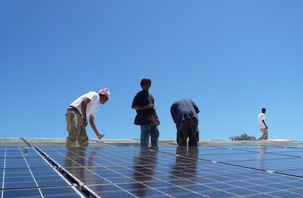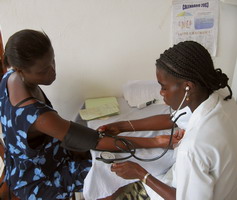
The TaiwanICDF response to climate change
|
|
Phil Barber, TaiwanICDF |
A look at how our current and future projects are helping partners adapt to the challenges brought on by changing weather systems around the globe.
An overwhelming number of scientists tell us that through climate change, Earth is under more stress than at any time in history. More importantly, we are told that this is only the beginning of a process that will become worse and worse unless serious measures are taken, right now.
Many of Taiwan's allies already face a relatively unique set of physical and environmental challenges, which will likely be exacerbated by climate change. Having established productive and long-standing relationships with partners across all regions of the world, we now consider it our duty to work on responding to these pressing issues. Here we look at how some recent TaiwanICDF initiatives are helping our partners adapt to climate change.
In the Caribbean and the Pacific
Scientists believe that climate change will affect our Caribbean and Pacific allies in quite different ways. There is currently a lot of speculation as to whether warming temperatures affect the frequency or intensity of hurricanes, which so often devastate huge swathes of Caribbean nations, and check development in its tracks. For Pacific islands, which generally lie at extremely low elevations, the threat is found in rising sea levels.
Having few natural resources is also a serious problem for both of these regions. While the energy consumption of all our allies in both these regions is—even collectively—relatively tiny compared to larger industrialized nations, it is still a priority stop importing costly and polluting fossil fuels. The small economies of small islands need to turn to clean and renewable energy sources as quickly as possible, so as to grow sustainably, protect the ecosystems on which so much of their economy relies, and ensure that economic growth is not hampered by future fluctuations or spikes in the price of future non-renewable energy sources.
|
In St. Kitts and Nevis, for example, a new information center has been fitted with generators running off solar panels, and technicians have received TaiwanICDF-funded training on the maintenance of this renewable technology. Through a similar TaiwanICDF project in the Pacific, 60 residences in Nauru are now generating their own power through clean solar energy, which not only makes for a carbon-free solution, but has also provided a reliable and constant supply of power, when the country had previously suffered from inconvenient outages.
Both of these projects form a solid foundation through which we can promote environmental protection in the Caribbean and the Pacific, in future.
In Africa
As deserts encroach upon previously fertile tracts of Africa, it is essential that this trend is reversed, and wasteland can once again be put to use for growing crops; otherwise, yields are likely to fall dramatically. In Africa, the TaiwanICDF's single biggest priority has always been to boost both the volume and production efficiency of agricultural produce, and a huge number of projects have been refined and improved over time as technology has advanced. A raft of measures introduced among our four African partners—Burkina Faso, The Gambia, Swaziland, and Sao Tome and Principe—are encouraging farmers to diversify their range of crops to suit changing local conditions, and use newer varieties of seed which produce hardier, drought-resistant harvests.
Through climate change, access to fresh water supplies in Africa is also likely to fall. Two TaiwanICDF projects in Swaziland—one ongoing, one new for 2009—are addressing this issue very specifically. The Lower Usuthu Smallholder Irrigation Project began in 2005 as a co-financing project between the TaiwanICDF and six other international development organizationss, and intends to address both the supply of water for agriculture, and provide a steady supply of clean drinking water to communities in the area for a long time to come.
|
Meanwhile, a new project for 2009—Access to Potable Water in Rural Swaziland—is targeting one of the major issues highlighted for Africa at the 16th Session of the UN Commission on Sustainable Development. This year, the TaiwanICDF is supporting the Ministry of Natural Resources and Energy in the Kingdom of Swaziland by drilling 40 boreholes in selected Swazi communities, which will each provide an estimated yield capacity of 80m3 of fresh water, daily. Moreover, the funding supplied will also be used to establish workshops providing for the long-term maintenance of each borehole, and workshops providing courses promoting water hygiene. Through these measures, a key pillar supporting sustainable growth in rural Swazi communities will be strengthened.
Furthermore, warming temperatures across Africa are expected to increase the prevalence of water-borne diseases, such as cholera, and of vector-borne diseases, such as malaria. This is why we have established projects such as the Sao Tome and Principe Malaria Control Project, which aims to keep these islands disease-free by eradicating the disease through treatment, then monitoring any possibility of the disease being brought in from overseas.
|
These three issues—agricultural productivity, fresh water, and public health—can all be directly affected by climate change. Despite being the poorest continent, and despite contributing the least to the process of climate change itself, it is Africa that stands to lose the most as global warming begins to cast its long shadow over the continent. It would be a great injustice if the most vulnerable members of the international community were denied their opportunity to flourish due to factors completely outside their control, which is why the TaiwanICDF exhibits such a strong commitment to working with its African partners on this issue.
Education for a Greener Future
Even if direct action is taken now, we are aware that climate change will continue to affect Earth for generations to come, which is why we believe investment in education is fundamental to the long-term solutions in the fight against climate change.
The TaiwanICDF runs workshops on green industry development, and agribusiness strategy and management, both of which inform participants from partner countries on how they might adapt to—and mitigate against—future climate changes.
In parallel with these workshops for professionals, we provide higher education scholarships for young people in our partner countries. Through a range of contemporary issues—such as marine sciences and resource management, tropical agriculture, public health, or environmental sustainable development, at undergraduate and graduate levels—the TaiwanICDF is equipping its allies with the tools and resources necessary to provide long-term solutions to what will probably be a long-term predicament. Scholarship students return to their home countries not only with skills, but also with enthusiasm and commitment. Climate change is a worldwide issue, and will affect every country. The more people the TaiwanICDF can get to communicate the message of a green tomorrow further and wider, the better.
In following international development trends, and in response to the threat of climate change, the TaiwanICDF understands the importance of clean energy, environmental protection and sustainability. By incorporating these factors into our strategic review as core elements for 2009-11, we have placed a response to climate change at the heart of our present and future practices, and we will continue to assist our partners to adapt to the changes already taking place.
- 更新日期: 2022/05/17
- 點閱次數:756



